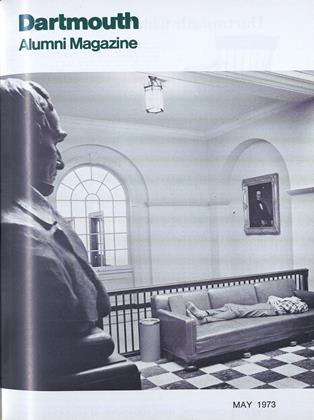In The Southern Review Stearns Morse, Dartmouth Professor of English Emeritus, writes about his "intimate and detached friendship," both joyful and sombre, with Robert Frost, The essay is entitled "Lament for a Maker: Reminiscenses of Robert Frost." Though the professor did not meet the poet until he had turned 30 and Frost 60, they had many connecting links. Morse had spent the first ten years of his life in Lawrence, Mass., where Frost lived in his adolescent years and attended the same Universalis! Church his family attended earlier. In helter-skelter fashion both men farmed off and on in Bath and Franconia, only 15 miles from each other. Frost spent many hours in the Littleton law office of Morse's uncle where, feet on desks, they swapped North Country stories. Professor and poet met at the Hanover home of David Lambuth, flamboyant Professor of English, where they "clicked at once." In a Model T Ford, Stanley Johnson, "The Caliph of Bath and Manhattan, dressed in a white beaver hat and the frock coat his father had worn to Washington as a Congressman in the 1830s, and Morse, dressed in his grandfather's brown beaver and frock coat, both costumes enhanced by white duck pants, . cotton gloves, and canes, called on Frost on c r Hill, frost greeted them with a fine Frosremark. "It's not the costumes I admire; it's The state of mind." He dropped in on Morse in Swiftwater where both talked their heads off, and Morse showed Frost the letter Ralph Waldo Emerson had written to his wife's grandfather. Poet and professor admired Emerson, each Emersonian with a difference. And so over the years, close friends, they saw each other frequently when the professor was promoted to Dean of Freshmen. On the poet's 75th birthday, the Dean teased him a little. "You bring out the best in us — a regular do-gooder you are," which was the last thing Frost wanted to be. "Go to hell," said Frost. "I don't give a damn, and you don't give a damn. That's why we get along so well together." After the poet's death, President John Sloan Dickey told Morse that Frost had more than once said, "Stearns doesn't want to own me," a discerning and true statement. Nor did Morse "want to be owned by him." The article recalls the give-and-take of two originals delighting in playful paradoxes and Yankee horse sense in a friendship more joyful than sombre.
Herman J. Obermayer '46 has published at $1.25 A Compilation of "Editors Viewpoint"from September 1971 through August 1972 taken from the Northern Virginia Sun of Arlington, Va„ of which he is the editor and publisher. The contents consist of six sections: Public Issues; Politics and Elections; The Passing Scene; National Conventions; News Media; and Land, Housing and Environment. The 64 pages, each one a confined editorial, attempt to give northern Virginians a chance to know where they are going as well as where they came from and also to see in better perspective the uniquely personal relation existing between a community editor and his readers. Mr. Obermayer believes that newspaper editors should challenge and interpret facts and take a cool position on hot issues even if they may occasionally prove fallible or dated. Too many times they pussyfoot. So he has fired both barrels about environmental protection, busing, the soundness of convict highway labor, the banning of all firearms, massive bombings as acts of bad faith and folly, the Alcoholic Beverage Control Boards, Defects in Kennedy Center, White House Receptions showing Presidents' style (Kennedy's, Johnson's, Nixon's), "Ms" as a serious magazine, the Corporation for Public Broadcasting as a threat to freedom, the dangers in too stringent apartment rules, benefits and dangers in" Highrisevilles, Pollution Control in the Florida Disney World, and the unfairness of banning pros in the Olympic Games. It is doubtful that Mr. Oberlander intended to print twice pages 35 and 36 even though medical pricing being hard to control and medical secrecy being unhealthy may be topics of major importance in his scale of values. Most important: like the best of T.V. and radio commentators, Mr. Oberlander respects the First Amendment and has the courage to speak out with clarity and conviction.
 View Full Issue
View Full Issue
More From This Issue
-
 Feature
FeatureWhat's So New About It?
May 1973 By Joanna Sternick, A.M. '72 -
 Feature
FeatureLAND OF LOVE
May 1973 By Ralph J. Fletcher '75 -
 Feature
FeatureSCOPE: Off-Campus Options Made Easier
May 1973 By MARY ROSS -
 Article
ArticleThe Indian Yell Revisited
May 1973 By Russell O. Ayers '29 -
 Article
ArticleFaculty
May 1973 By ROBERT B. GRAHAM '40 -
 Article
ArticleHis Own Man
May 1973 By DERO A. SAUNDERS '35













